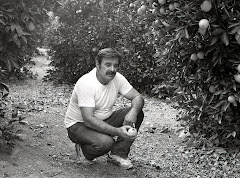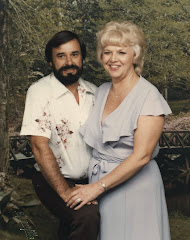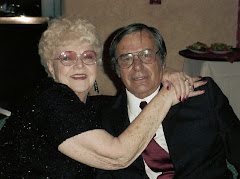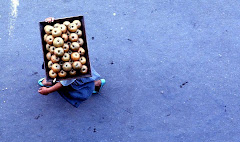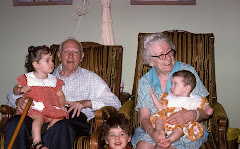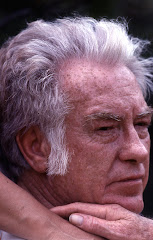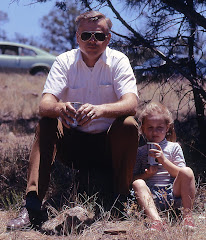I was born in Compton, California in late 1947. At that time we lived in a small one-bedroom house located 2030 Stockwell Street, not far from Watts. We lived there about three and a half years or so after I was born and moved from there when my mother became pregnant with her second child.
I have many, many memories as a little kid at this house, believe it or not. My earliest recollections revolve around friends, playmates, neighbors and relatives. Our neighbors to the west were a Hispanic family that used to baby-sit me when my mom and dad both worked at Grant Apparel in downtown Los Angeles. Mom was a seamstress and my dad was a clerk in their administrative offices.
The Mexican family next door fed me beans and tortillas and talked to me in Spanish while they babysat me. I used to eat, or rather chew on sticks of sugar cane I found in their kitchen drawers. I am convinced this is where I picked up my instinctive ability to learn Spanish in my later years, and became so fond of the Mexican cuisine, and even the people.
I also have some memories of Grant Apparel, too, because sometimes on Saturdays my dad had to work and he took me with him. I can also remember a party that was once thrown there for the company and even some of the songs they danced to.
Anyway, back to Stockwell Street. As I said, it was a tiny one-bedroom home. I slept in my parent’s bedroom in a crib until my dad bought me a rollaway bed that he would set up for me each evening in the living room where I slept.
I remember that I broke the crib, I think, because I remember I could let myself out by swinging the side out and sliding off the mattress to the floor. Apparently one end of the crib side had broken free of one of the vertical slide bars and the side could then swing on the other slide as if it were a hinge. Maybe that's why I got the new bed, or maybe it was just time for me to move out of my parent’s bedroom.
We had a fireplace in that house with a ceramic tile firebox. It had a gas valve in it, so my dad put an open-flame, free-standing gas furnace in it they had purchased at Phillips furniture store in downtown Compton. It was a cool furnace because it had a row of ceramic pieces in front of the flames to keep kids like me from reaching into it. Sometimes they would glow from the heat.
We bought a television about 1949. It was a black and white (of course) Admiral. I remember my parents loved to watch Doyle Dell's western music variety show down at the Big Red Barn live on KTLA channel 5.
Mom and dad kept chickens in a chicken coop they had made in the back yard so we ate fresh eggs and dad would butcher a chicken or two now and then. One day my dad was butchering some chickens with the help of my uncle David. He was about twelve or thirteen years old then. My dad had David hold the chicken's feet, while dad tied the chicken's neck to the chopping block with a piece of string. Down came the hatchet and lopped off the bird's head.
The neck of the bird began to flip around wildly slinging blood everywhere. My uncle David let go of the bird and it jumped to its feet. So did David and he started to run. To his horror, the chicken followed him, seeking revenge he thought, and followed David's zigzagging course as he fled the pursuing bird. After about ten seconds, the bird flopped over. I think David was about to do the same thing. I wonder what David dreamed about that night?
My first and most favorite playmate was my uncle Leon who was born six moths after I was. Whenever Leon and I got together you could count on some shenanigans worth at least a spanking or two. I’ll elaborate on some of the naughtiest ones in another blog.
I remember one time we got dirt clods from the freshly tilled flower beds next to the kitchen and tossed them into my mom’s freshly scrubbed kitchen through the small pass-thru door the milkman used to set the delivered bottles of milk in. That netted us a good paddling.
In that same garden were these little critters kids today call rollie-pollies, or in other words, sow bugs. We used to take them out and play with them so we could see them roll themselves up into little balls. I don’t know how he did it, but Leon got one of them up his nose. It took my mom a long time to fish it out with a pair of tweezers. It was trying to go deeper into his nose as my mom went after it with the tweezers. Leon ended up with a sore and bloody nose.
Leon and I had twin tricycles and we would ride them in the driveway of our house, and beyond if we could escape. Our driveway was straight off the city street to the garage. It had two concrete ribbons that ran parallel to each other. The tires on the right of the car would drive on the right concrete ribbon, and the left tires on the left ribbon. Between them was grass.
The ribbons were wide enough to run our tricycles on. So, we would race down one side and turn around on a slab near the city sidewalk and go back up the other side and turn around on the garage slab. I mention this because just the other day I looked up this old house on Google Earth. They had a magnificently clear view of that old house, and, too my amazement, the yard, driveway, house and all are still as I remember them today! 54 years ago we left that place and it hasn’t changed a bit, right down to that old style driveway!!!
We didn’t have a refrigerator in that house. In those days we had an ice box, which looked just like a refrigerator except you put inside of it daily deliveries of blocks of ice. It had a hole in the bottom of it to allow the melting ice to drain out into a pan below. This kept my mother busy, and made leaving home for visiting, etc nearly impossible. To resolve this problem, my dad drilled a hole through the floor below the icebox and attached a drain hose to the refrigerator’s drain then passed it through the hole in the floor. Voila, instant drainage! Mom thought my dad was so smart for having concocted this resolution.
The icebox was a place I would often get myself into trouble as a toddler. I would pull open the door and start tossing out all of the fresh vegetables. (Reminds me of my grandson Mitchell). One day my mom caught me in the act. “Michael Frederick Harrington, you get out of there!” It startled me so bad I tossed the tomato I had in my hand back into the icebox and shut the door and scurried off. My mother loves to tell this story.
About February of 1952 Mom became pregnant with my first sibling, Ellen Marie. I was four years old and wasn’t interested in having any brothers or sisters. After all, I had Leon, and that was all I needed.
We had to leave the house on Stockwell Street, and look for a house with another bedroom. In the interim, we had to live in my grandparent’s garage on Bahama Street while escrow closed on a house nearby. It was like tossing Br’er Rabbit into the briar patch, so to speak. I would have been perfectly content to have lived out my entire youth there since Leon and I were together now 24/7, but I doubt if my mom and dad, (and our bottoms) could have endured the shenanigans.
To Mom and Dad’s relief, escrow closed and we moved in to one of the most beautiful houses I had ever seen. The best thing about it was it was only a few blocks west of Bahama Street and Leon. I had my own bedroom and it was so cool! On my bedroom floor my mom and dad and put down linoleum. It had squares in it with different illustrated nursery rhymes in each one. I could read them all by then: Hey Diddle-Diddle, Old King Cole, Sing a Song of Six Pence, Jack and Jill Went up the Hill, Mary, Mary, Quite Contrary, and so on.
On my bedroom walls Mom had placed other colorful nursery rhyme characters made of laminated paper about a half of an inch thick. I felt special. They were colorful and made for a cheery bedroom.
I even had my very own record player which really wasn’t much bigger than an overnight case. Considering the evolution of music media these days, do I need to explain what a record player was? It was about 12 inches square and 5 inches thick with the lid closed. You could close it with latches and carry it just like a small case with a handle like a briefcase. it played 78's and that's about it. For you new kids, 78's were a record's speed. It meant 78 rpm's. There were no 45's yet.
I had a lot of children’s records with (you guessed it) nursery rhymes. Some were just musical stories. I can, to this day, quote you verses from one about a boy who painted his wagon green without a paint brush, so he used his bare hands and smeared it on.
Aside from my cool bedroom, we had an awesome enclosed patio with a built in barbeque grill, and cool patio furniture complete with swing and all. The backyard was green and lush with arbors of grapes. The vines seemed to be everywhere like a jungle. Also everywhere were huge, and I mean HUGE spiders which seemed to me to be as big as my hand. Their webs were like steel nets.
Now that I was getting older, my mom assigned me chores. The one I remember was having to put away the ‘silverware’ after my mom had washed the dishes. It never seemed an opportune time to do my chores as it would interrupt my favorite pastime, watching television. Sadly, I was addicted to the boob-tube from an early age. I mean, what kid wouldn’t be addicted when there were so many neat shows for us?
I always had to watch Sheriff John’s Lunch Brigade at noon, and in the late afternoons I had to see my favorites, too. Those would have been Wild Bill Hickcock, Roy Rogers, The Lone Ranger, Superman, and Red Ryder. All were sponsored my sugary breakfast cereals made by Kellogg’s of Battle Creek. They were Sugar Corn Pops, Frosted Flakes, et al. all of which made a lot of dentists rich, I am sure.
But my all-time favorites were the Hal Roache’s Little Rascals/Our Gang characters whom we watched on Saturdays mornings. They were timeless. They looked and acted like me and did things like Leon and I would do to get our tails spanked.
I couldn’t comprehend it when my mother had told me they weren’t little children anymore. They were all grown up like her.
Next best were the classic slapstick comedians, Laurel and Hardy. To this day I revel in their genius comic antics. No one has ever come close to approximating their films for sheer hilarity.
I always had cowboy holsters and cap-guns strapped to my side whenever I went out to play, it seemed. Leon and I rode stick ponies and rounded up the bad guys together. Other times we were the bad guys whenever we got into Dutch, and that was more often than I can remember. On more than one occasion we got into someone’s garage and got into things we had no business touching. It always came back on us, and we got our fannies tanned as we should have.
Summers were warm but never so hot as to need air conditioning, especially in the evenings. I remember those cool coastal breezes that kept it so nice, especially in the evenings. We were less than fourteen miles from the ocean and it made summers quite bearable.
Trips to the ocean were common, but I remember being petrified of it when I was very young. My mom was really upset with me one day when they wanted to go to the beach and sit on the shore near the waves as they lapped up onto the sand. She literally had to drag me as I screamed, “Why does it keep flushing?” In later years I outgrew my fear of the ocean. Even so, I am sure I ruined more than one outing over that phobia.
Our little piece of heaven didn’t last very long, and I never had the chance to finish kindergarten with my beloved Miss Miller. The complexion of the neighborhood was changing and my mom and dad said we had to move. It was traumatic for me to leave the beautiful little city we lived in. Little did I know that would all soon evaporate anyway.
So, off we moved 45 miles to the east into a rural part of Riverside county shortly after Ellen was born. I think she was only 4 months old when we made the move.
End of part 1



